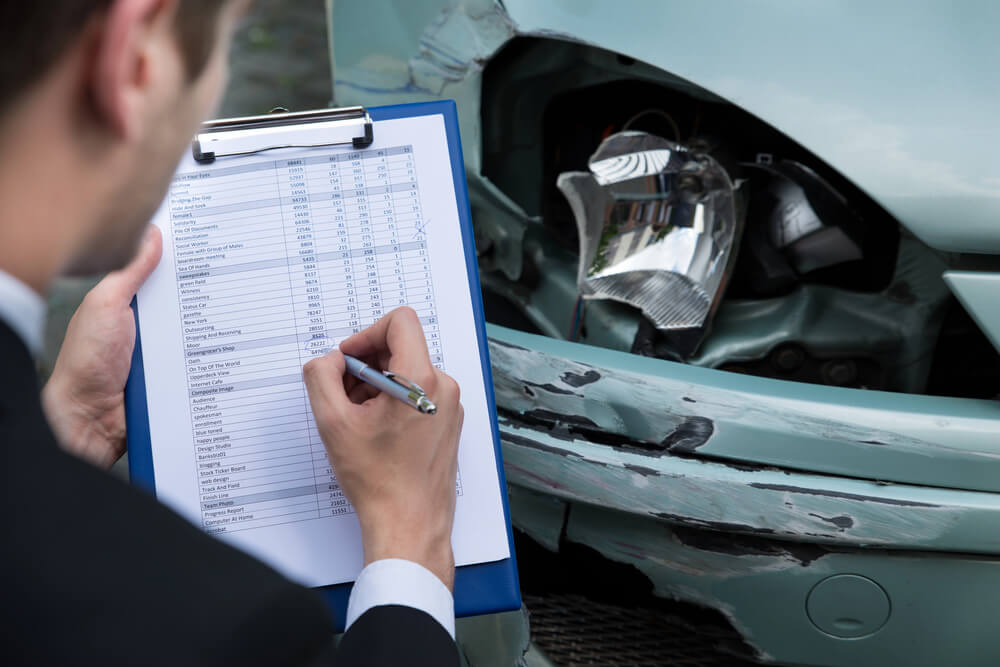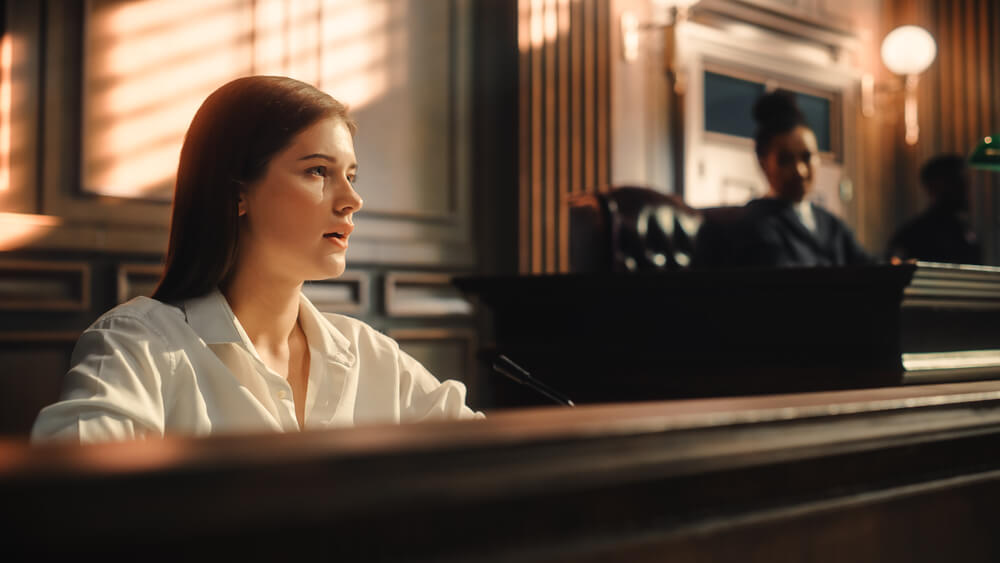When you file an insurance claim after an accident, the insurer will send out an adjuster to investigate the case. Their job is to determine who is at fault so that the insurance company can make an informed settlement decision.
So how do adjusters determine who is at fault? The adjuster collects information and analyzes the evidence, but it is important to know that you can contest the adjuster’s decisions if you disagree.
What Is an Insurance Adjuster?

An insurance adjuster, or claims adjuster, is a trained investigator who examines every aspect of an accident when the insurance company receives a claim. They look at the damages, medical records, and other evidence to determine if the company must pay a settlement or if they need to adjust the settlement amount.
Keep in mind that insurance adjusters are employees of the insurance company or independent contractors hired by the company. This means that they represent the company’s interests first and foremost. Even though adjusters have an obligation to be fair and unbiased in their investigations, it is still a good idea for you to work with an attorney who will conduct their own investigation with your best interests in mind.
What Determines Fault in a Car Accident?
The person who demonstrated negligence or violated their duty of care toward other drivers is typically at fault in a car accident. Adjusters determine who is at fault by examining all of the evidence from the scene, including:
- Vehicle damage
- Photographs of the area
- Skid marks
- Videos or dash cam footage
- Debris or road conditions
A close look at vehicle damage and the location of the accident can reveal how an accident happened. For example, if a sideswipe accident happens near an on-ramp, damage to the vehicle’s right side can make it fairly clear that the other driver wrongfully merged into them.
Adjusters also review local traffic laws to determine if either driver committed a violation. Some cities or streets may have unusual traffic regulations. For example, some intersections might not allow U-turns even though they are permissible in most circumstances. If a driver violates this type of traffic law, they will bear some or all of the fault for an accident.
Do Adjusters Determine Fault Based on Witness Testimony?

Witness testimony is very important during an insurance adjuster’s investigation. If other drivers or passers-by saw the accident happen, their account of the events can reveal exactly what happened. Their statements can refute or corroborate the drivers’ version of events. This is especially valuable if the other evidence is not clear enough to establish who is at fault.
Adjusters also pay special attention to the police report. Law enforcement officers can serve as “expert witnesses” on the scene of an accident. When the police receive a call about an accident, they arrive at the scene to ensure everyone’s well-being and conduct an initial investigation. The police report is a key result of this process. Both sides can use it as evidence to support their case, and the insurance adjuster will also use it to help determine fault.
How Long Does It Take for an Adjuster To Determine Who Is at Fault?
In most states, including Arizona and Colorado, insurance companies have 30 days to investigate a claim and issue a decision on whether to accept or deny it. Other states, such as California or New Mexico, are slightly more lenient and allow 40 to 60.
The exact amount of time it takes to determine fault can vary, though. A straightforward investigation may conclude well ahead of the deadline. If the case is more complex, adjusters may request an extension in order to collect more evidence and follow up on additional leads.
Keep in mind that the investigation does not necessarily end when the insurance company makes a decision. This is still just the beginning of the claims process. If both sides agree to negotiate a settlement, they will share all of their evidence in a process known as “discovery.” Discovery can bring new facts to light, and adjusters may continue to investigate to determine if this new information affects their fault determinations.
Will the Adjuster’s Decision Affect Your Insurance Rates?
If an investigation deems you to be at fault for an accident, your insurance rates will likely go up. Insurance companies will see you as a greater risk if you were previously liable for someone else’s damages. This can apply even if you were only partially responsible for an accident.
However, just because an insurance adjuster decided you were at fault does not mean you have to accept their decision without a fight. You have every right to take steps to prove you did not cause the accident and that the other party is responsible for compensating you.
How Can You Prove You Did Not Cause an Accident?

The period of time after an accident can be confusing and overwhelming, but you should try to remain calm and take the right steps to prove you did not cause the crash. This is especially important in states like Arizona that have comparative negligence laws.
Comparative negligence means that the amount of compensation you can get through an insurance claim decreases based on your percentage of fault for the accident. To recover the full amount of damages caused by the other driver, you need to know what to do if an insurance adjuster pins some of the blame on you.
Document the Scene
The evidence you collect immediately after an accident can make a huge difference in proving the other driver’s fault. However, make sure to first move to a safe location and check yourself and others for injuries. The well-being of everyone involved is a higher priority.
When it is safe to do so, take plenty of photographs. Get pictures of the damage to your vehicle, the scene of the accident, and any injuries you sustained. Write down the license plate numbers of each vehicle or take photos of those as well. Exchange information with the other driver and get contact information from any witnesses who saw the accident happen.
Avoid Admitting Fault
One of the biggest mistakes many drivers make after an accident is admitting their own fault. Be extremely careful of what you say after a crash. Something as simple as apologizing to the other driver can be an admission of fault. Even if you believe that you did cause the accident, it is in your best interest to let investigators and adjusters determine how it unfolded.
You should be even more mindful of what to say to insurers. This applies even when you are reporting the accident to your own auto insurance company. Only state the facts of the accident. Avoid speculating or theorizing about how it happened, and of course, avoid admitting fault in any way.
Call Your Personal Injury Lawyer
Your personal injury lawyer is an effective resource at every stage of your accident claim. They can protect you from wrongfully receiving the blame for an accident by advising you on what to say to the insurance company. They can also directly communicate with insurers on your behalf.
An experienced personal injury attorney can navigate insurance policies just as competently as an insurance representative. While the insurance company might try to take advantage of you during a vulnerable time, your attorney can negotiate with them on an even playing field. Their investigation plays a significant role in proving your lack of fault and establishing the other driver’s liability.
What Should You Do if the Adjuster Claims You Are at Fault?

The adjuster’s investigation is not the be-all and end-all of your case. You can dispute their decision if they claim that you are at fault. The best way to do this is by working with a legal team that will conduct its own investigation.
Your lawyer will make sure to collect every piece of evidence that will swing the case in your favor. This includes medical documents, traffic camera footage and any other records that the adjuster might overlook. An attorney will also negotiate with the insurance company on your behalf or work to convince a judge and jury of your innocence if the case goes to trial.
What Happens if Insurance Cannot Determine Who Is at Fault?
There are some types of accidents where it is extremely difficult to determine who is at fault. An insurance adjuster might have a hard time if there were multiple vehicles involved or if there were no witnesses to back up the drivers’ testimonies. Sometimes, weather or road conditions can be a factor, and it may not be clear if one of the drivers failed to take adequate precautions.
If the insurance adjuster cannot determine who is at fault, you should consult with a local car accident attorney. Your legal team may have better results due to their familiarity with local traffic laws and because they have a commitment to protect your individual rights.
If neither side can definitively establish fault, it may not be possible to hold the other driver liable for your damages. However, you can likely recover your losses through your own auto insurance policy. If you carry collision coverage on your auto policy, it will cover the damage to your vehicle in an accident that was not your fault. This makes it a great safety net for accidents where neither driver is liable.
Can You File an Appeal if the Insurance Company Will Not Pay?
If the at-fault driver’s insurance company denies your claim or refuses to pay, you can file an appeal through the insurer’s internal process. Your attorney can help you with this, making sure you never have to deal with the insurance company yourself at any point. Filing an appeal will trigger an internal review to check if bad-faith practices caused the issue.
If the appeal process does not result in a better outcome, you may have no choice but to file a lawsuit. Most personal injury claims are resolved without needing trial, but taking the other party to court can sometimes be the only way to hold them accountable for the damages they owe. If the insurance company is in the wrong, the judge’s decision will force them to pay you appropriate compensation.
It is important to watch out for signs of bad faith from the insurance company throughout the entire claim process. If the insurance adjuster overlooks evidence during the initial investigation or assigns fault to you without due cause, it can be a sign that the insurance company is willing to resort to bad faith practices to protect their interests.
How Can You Contest an Adjuster’s Decision in Court?

If you decide to file a lawsuit and contest the insurance company’s decisions in court, you can depend on your legal counsel to present your case on your behalf. An experienced trial attorney knows how to organize the evidence and voice their arguments in a way that has the best chance at swaying a judge and jury.
To help ensure success at trial, do not hesitate to ask your attorney any questions that come to mind. It is best for you to understand the trial process fully and to have a well-practiced testimony. Communicating openly with your legal counsel is the best way to achieve that. Most importantly, try to remain calm and patient. The trial process can sometimes add weeks or months to your overall claim timeline.
Sargon Law Group Can Help You Contest the Adjuster
At Sargon Law Group, we are passionate about making sure that injured people have strong representation and a fair chance to recover their losses. Our car accident attorneys know how adjusters determine who is at fault in an accident, and we use that knowledge to hold the insurance company responsible throughout the settlement process.
We represent clients in car accidents throughout Arizona, Colorado, New Mexico and California. Contact us today to schedule a free consultation.
